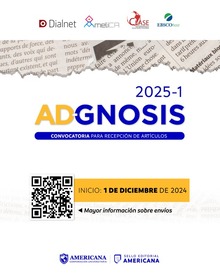Incidence of the organizational dynamics in the development of the new knowledge in the universities
DOI:
https://doi.org/10.21803/adgnosis.v7i7.289Keywords:
Organizational dynamics, Knowledge Management, UniversitiesAbstract
At present and in the face of the emergence of new technologies with innovative trends in which knowledge is a fundamental axis to promote development in societies, it is necessary to understand the ways of transferring it, making it an added value for companies; that is why this paper aims to study the relationship between organizational dynamics that affect the development of new knowledge in universities, as an internal source to generate competitive advantage. In its preparation, the descriptive method was used, supported by the documentary review, with a qualitative approach, which provides depth to the study, necessary because it is a phenomenon with scarce background and high social impact, justifying its relevance and validating its commitment to social responsibility. As findings, it is emphasized that organizational capacities represent a predominant factor in the development of new knowledge because rethinking implies permanent research processes. It was concluded that within the factors that influence the organizational dynamics for the creation of new knowledge, it is transformational planning, capable of generating actions that respond to the systemic approach of society, whose innovative knowledge provides a variety of solutions to complex problems.
Downloads
References
Acosta, J.; Longo, M.; Fischer, L. (2013). Capacidades dina?micas y gestio?n del conocimiento en nuevas empresas de base tecnolo?gica Cuadernos de Administracio?n, vol. 26, nu?m. 47, julio-diciembre, 2013, pp. 35-62 Pontificia Universidad Javeriana Bogota?, Colombia
Ariza Y. (2015). Ensen?abilidad de las normas internacionales de contabilidad y su incidencia en la pra?ctica docente en la universidad CUC”, Revista econo?micas CUC. Universidad de la Costa CUC.
Barney J. (1991). Firm resources and sustained competitive advantage. Journal of Management, Vol.17, Pp. 99–120.
Chiavenato, I. (2009). Comportamiento organizacional. (2 Ed.), Me?xico: Mc-Graw Hill.
Dosi, G., Faillo, M. & Marengo, L. (2003). Organizational capabilities, patterns of knowledge accumulation and governance structures in business firms: An introduction. Conferencia Organizational Innovation With in Firms, Paris
Drucker, F. (1993): La sociedad poscapitalista. Ediciones Apo?strofe, Barcelona.
Felsenstein, D., (1994): University-related science parks “seedbeds” or “enclaves” of innovation?, Technovation, 14, pp. 93–110.
Garbanzo G. (2016). Desarrollo organizacional y los procesos de cambio en las instituciones
educativas, un reto de la gestio?n de la educacio?n. Revista Educacio?n 40(1), 67-87, e-ISSN: 2215-2644, enero- junio, 2016.
Grant, M., (1991) “The resource-based theory of competitive advantage: implications for strategy
formulation” from California Management Review 33 (3) pp.114-135, Berkeley, Calif.: University of California.
Go?mez, M., Galiana, R., Mira, I., Verdu?, J., & Sancho, J. (2007). An empirical approach to the organizational determinants of spin-off creation in European universities. International Entrepreneurship and Management Journal, 4(2), 187– 198. doi:10.1007/ s11365-007-0061-0
Hebel, M. (2007). Ligth bulbs and change: Systems thinking and organizational learning for new ventures. The Learning Organization, 24 (6), 499-509
Hong-bing, L., & Lei, L. (2007). DEA-Based Project Knowledge Management Performance Evaluation. Paper presented at the International Conference on Management Science & Engineering.
Kale, P., Singh, H. and Perlumutter, H. (2000). Learning and protection of proprietary assets in strategic alliances: Building relational capital. Strategic Management Journal, 21 (3), 217-237
Lloria, B. (2000). El conocimiento como recurso y capacidad. Una Aproximacio?n a la Gestio?n del Conocimiento como Ventaja Competitiva. Universidad de Valencia, Working Paper
Mori?n E. (2011). La vi?a. Me?xico. Paido?s
Nonaka I., & Takeuchi H. (1995). La organizacio?n creadora de conocimiento. Mexico: Oxford, University press
Organizacio?n para la cooperacio?n y el desarrollo econo?mico [OCDE]. (2012). Evaluaciones de poli?ticas nacionales de Educacio?n. Pari?s: OCDE y el Banco Internacional de Reconstruccio?n y Fomento/el Banco Mundial.
Ortega & Gasset J. (1930). Misio?n de la Universidad. Madrid, Espan?a, Alianza Editorial.
Peng, M. (2006). Global Strategy. Cincinnati: Thomson South-Western.
Peteraf, M. (1993). The Cornerstones of Competitive Advantage: A Resource-Based View Strategic Management Journal, Vol. 14, No. 3. (Mar., 1993), pp. 179-191.
Revilla D., (1998) “Estilos de aprendizaje”, Temas de Educacio?n, Segundo Seminario Virtual del Dep de Educacio?n de la Pontificia Universidad Cato?lica del Peru?, disponible en http://www.pucp.edu.pe/~temas/ estilos.html
Rodri?guez, M., Rui?z, C.& Armario, G. (2012). Las empresas Born Global: un enfoque de capacidades dina?micas. Revista Internacional de la Pequen?a y Mediana Empresa, 1 (4), 49-67.
Rowe J., A. (2004). Inteligencia creativa. Financial Times/ Prentice Hall.
Siegel. S., Westhead, P. y Wright, M., (2003): Assessing the Impact of Science Parks on Research Productivity: Exploratory Firm-level Evidence from the United Kingdom, International Journal of Industrial Organization, 21, pp. 357-69.
Sveiby, E. (2005). Leveraging Synergies between Learning Objects and Knowledge Management. Disponible en: http://www.sveiby.com/articles/ KnowledgeManagement.html.
Westhead, P. (1997). R& D ‘Inputs’ and ‘Outputs’ of Technology-based Firms Located on Science Parks. R&D Management, 27, pp. 45–61.
Downloads
Published
Versions
- 2023-02-02 (2)
- 2018-01-25 (1)
Issue
Section
License
Copyright (c) 2018 ADGNOSIS

This work is licensed under a Creative Commons Attribution-NonCommercial-NoDerivatives 4.0 International License.






